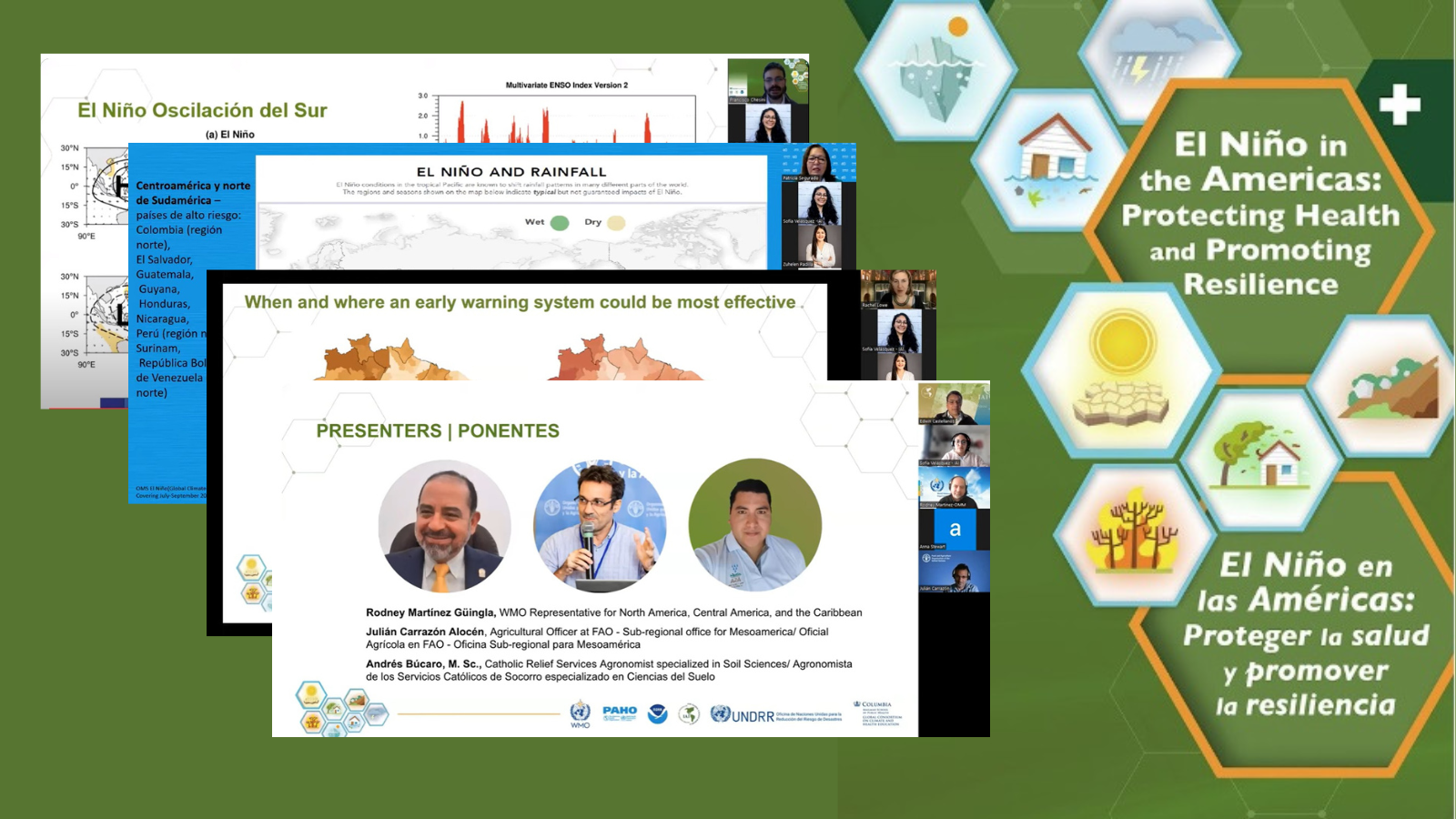El Niño in the Americas: Practical Knowledge to Protect Health and Promote Resilience

The recordings and presentations of the free course focused on the health response to the El Niño Southern Oscillation are now available on the Inter-American Research Institute for Global Change (IAI) website at no cost to users. The course was organized by the IAI, the World Meteorological Organization (WMO), the United Nations Office for Disaster Risk Reduction (UNDRR), the National Oceanic and Atmospheric Administration (NOAA), the Pan American Health Organization (PAHO) and the Global Consortium on Climate and Health Education (GCCHE).
More than 600 people participated in the online version of the course, from October 10 to October 26. The objective was to provide different public officials, planners, professionals, and any interested party, with the knowledge and tools necessary to prepare for local and regional impacts related to health and climate in the face of a new cycle of the El Niño phenomenon in the region.
You may view the materials for the following sessions:
- Introductory session focusing on El Niño and the reduction of its impacts on the health sector: Forecast, best practices and recommendations, where speakers provided information on tools for decision makers and technical teams, shared experiences and cases of good practices in health prevention. Speakers included Anna Stewart-Ibarra, Executive Director of IAI, Andrés Orias, Programs Officer of the Regional Office for the Americas at WMO, Daniel Buss, Head of the Climate Change and Environmental Determinants of Health Unit at PAHO, José Gálvez, from the National Oceanic and Atmospheric Administration (NOAA), Paulo Ortíz from the Cuban Meteorological Institute, Laura Lee Boodram from the Caribbean Public Health Agency (CARPHA), Francisco Chesini from the Ministry of Health of Argentina, Nahuel Arenas, Head of the Regional Office for the Americas and the Caribbean at UNDRR, and Cecilia Sorensen, Director of the Global Consortium on Climate and Health Education.
- Session 1, which dealt with the topic of Drought and Nutrition, featured the participation of Rodney Martínez, WMO representative for North America, Central America and the Caribbean, who delved into the El Niño phenomenon and recommendations for dealing with it, Julián Carrazón Alocén, agriculture officer for the FAO Subregional Office for Mesoamerica, who specialized his talk on El Niño and its effects on agriculture and with Andrés Búcaro, president of the board of directors of the Guatemalan Association of Soil Sciences who presented on water, the soil and El Niño and how to revitalize small-scale dryland agriculture.
- Session 2 on Extreme Temperatures was carried out by Francisco Chesini, technical representative of the “National Program for the Reduction of Health Risks Associated with Climate Change” of the Ministry of Health of Argentina, who delved into Climate Change and heat waves, and Tania Ita, a meteorological research specialist at the National Meteorology and Hydrology Service of Peru who presented a case study on heat waves and human health in Peru.
- Session 3, which dealt with the topic of Water Quality, featured Patricia Rodezno, PAHO Health and Environment advisor, who spoke about the quality and safety of water and its relationship with El Niño, and Salvador Ayala, Geographer and master's degree and doctor. in Public Health from the University of Chile who presented initiatives for the adaptation of the health sector to the climate, with an example from Chile.

- Session 4 on Disasters was carried out by José Marengo, general coordinator of Research and Development of CEMADEN, who delved into the ENSO (El Niño Southern Oscillation) and its influence on disaster risk, and Carolina Portaluppi, UNDP consultant, who spoke about the creation of community situation rooms, focusing on Ecuador.
- Session 5, which dealt with Zoonotic and Vector-Borne Diseases, featured Rachel Lowe, ICREA Research Professor and Global Health Resilience Team Leader at the BSC, who delved into zoonotic and vector-borne diseases, and Ángel Muñoz, senior researcher at the BSC, who spoke about a new system for monitoring and predicting diseases transmitted by Aede.
- The last session on Air Quality was given by Juan José Castro, regional advisor on air quality and health at PAHO, who spoke about air pollution and health, and William Checkley, professor of medicine at Johns Hopkins University, who conducted a presentation on the effects of climate variability on health with a practical case from Peru.
You may download the presentations and view the recordings here
__________
If you are looking to share information of relevance to the IAI community, please send it to communication@dir.iai.int to be disseminated in social networks and other media.
Remember to subscribe to our newsletter here to keep informed.
Back to Table of Contents
